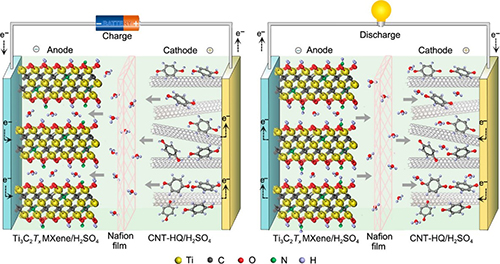
A research group led by WU Zhongshuai from the Dalian Institute of Chemical Physics of the Chinese Academy of Sciences (CAS), in collaboration with WANG Xiaohui from the Institute of Metal Research of CAS, developed high-energy-density, hydrogen-ion-rocking-chair MXene based hybrid supercapacitors. The study was published in ACS Nano.
MXene, a family of two-dimensional metal carbides and carbonitrides, have attracted widespread interest due to their excellent electrochemical energy storage properties. As a representative, Ti3C2Tx has already demonstrated to be a promising pseudocapacitive electrode material with high capacitance of 1500 F/cm3 (380 F/g).
However, aqueous symmetric Ti3C2Tx-based supercapacitors are usually limited by low voltage window (~0.6 V), due to irreversible oxidation of Ti3C2Tx at high potential. Hence, integrating high-capacitance, high-conductivity and electrochemically stable cathode and MXene anode is necessary to build high-voltage, high-energy-density MXene-based supercapacitors.

Schematic of the hydrogen-ion-rocking-chair MXene carbon nanotube-hydroquinone hybrid supercapacitors. (Image by SHI Xiaoyu and HOU Xiaocheng)
Taking Ti3C2Tx as negative electrode, carbon nanotubes as positive electrode, H2SO4 solutions as negative electrolyte, H2SO4 solutions containing hydroquinone as positive electrolyte, and a proton-permeable Nafion film as separator, the researchers fabricated asymmetric hybrid supercapacitors.
Hydroquinone and quinone reversibly converted to each other during charge-discharge, accompanied by protonation and deprotonation processes. Meanwhile, hydrogen ions reversibly intercalated and extracted in Ti3C2Tx MXene anode, inducing a change of the titanium oxidation state.
This reversible electrochemical behavior was accompanied by hydrogen ion fast transport between the positive and negative electrodes, thereby the device was called as hydrogen-ion-rocking-chair hybrid supercapacitors, similar to lithium-ion batteries.
Attributed to high pseudo capacitance of both electrodes, matched potential window and excellent reversibility, the hybrid supercapacitors exhibited a voltage up to 1.6 V, significant stability of 100% retention after 5000 cycles and a record energy density of 62 Wh/kg, exceeding all reported aqueous MXene-based supercapacitors.
This work will advance high-energy-density electrochemical energy storage devices toward actual applications.

86-10-68597521 (day)
86-10-68597289 (night)

52 Sanlihe Rd., Xicheng District,
Beijing, China (100864)

